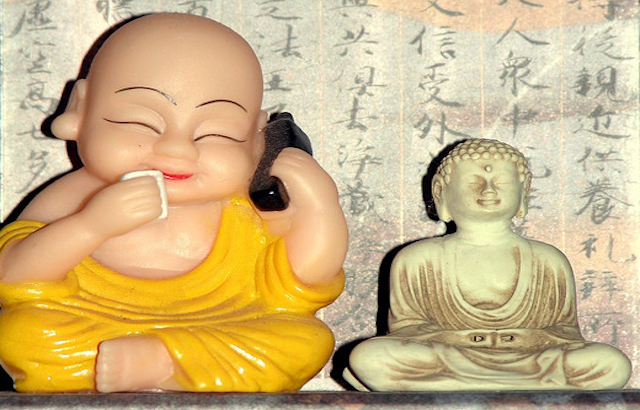
“To change the world we need to combine ancient wisdom with new technologies.” ~Paulo Cohelo
This weekend I was honored and grateful to speak at Wisdom 2.0, a conference that addressed the question:
How can we use the technologies of our age, from cell phones to social media, with mindfulness, meaning, and wisdom?
Organizer Soren Gordhamer, author of Wisdom 2.0: Ancient Secrets for the Creative and Constantly Connected, created nothing short of magic by attracting participants from all sides of the conversation, from Twitter and Facebook to Yoga Journal and Samovar Tea.
If you’ve ever sat in a room with people who love you, want the best for you, and respect your words and needs, you have a fraction of an idea of what it felt like to attend this conference. There was just that much positive energy radiating from every direction.
During the first panel of the first day, Chris Sacca (Strategic Advisor for Twitter) joked he’d never, through all his experiences in tech conferences, had so many people pay such close attention to him.
It was just that sort of crowd: people who want to bring a sense of presence and gratitude to every moment, harnessing technology to meet those needs instead of letting technology hinder them.
I kept an ear out for the most practical suggestions to manage the constant flow of data through tweets, texts, and emails without letting it consume our lives. Since I missed some of the second day, these mostly come from the first:
1. Make deliberate choices about time.
Though most of us probably receive far less email than Chris Sacca, we can all benefit from his conclusion about email: He’s only willing to spend so much time reacting to communication from people instead of creating life as he wants to experience it. For Chris, this means only responding to emails that absolutely require his response.
He cited some fascinating research that reveals we actually receive a little dopamine rush when we see something new in the inbox.
My suggestion: realize it’s worth potential guilt over ignoring non-essential messages if it means allowing you more time to be as you’d like to be, and find the dopamine in a healthier way, by doing something new instead of waiting for a new message.
2. Box out time to put technology away.
Brad (Google VP of Products) offered this simple advice, perhaps one of the most important ideas: plan for specific times when you won’t engage with technology in any way. When you are using technology, aim to create a new type of flow so you don’t lose yourself or feel anxious when dealing with what’s in front of you.
3. Remember: the most precious thing you can give someone is your presence.
Roshi Joan Halifax made this beautiful observation: Though social networking can bring us closer together, nothing can replace warm hand-to-warm-hand contact.
If you keep in mind that your presence—your attention—is the most precious thing you can give someone else, perhaps you’ll be less tempted to multi-task face-to-face encounters by tweeting, Facebooking, or emailing. It’s this type of simple but powerful understanding that can help us tame the compulsion to connect digitally when it compromises physical connection.
4. Be mindful of your reasons for connecting to technology.
Tami Simon, of Sounds True, made some insightful observations about her instinct to pull out a piece of technology. Others from the panel chimed in, creating this list:
- For stimulation
- For confirmation of importance (as in, I got so many emails, I must be important!)
- To connect with other people
- To have something to do when anxiety creeps in
- To find an escape from the rawness of an experience or to feel in control
Self-awareness is such an important step. If you realize why you’re turning to technology in times when connection or learning new information isn’t critical, you’ve made the first step to reconnecting with yourself.
5. Get the most important things done and let go of the rest.
If you don’t live in a world where you’re in control of your tasks and schedule, this might be challenging. Still, there are probably a handful of tasks you don’t really need to complete but feel obligated to do for one reason or another.
Instead of assuming you have an endless list of things to do, which probably leaves you with little time at the end of the day, be clear about what’s important to you and what you can leave undone. It’s okay not to do everything. It’s okay to have emails in the inbox. It’s okay to not update your blog for a day. You deserve time to disconnect.
6. Make minimal commitments to yourself for a clear mental space.
Many of us don’t consistently honor what we need to do to maintain physical and emotional well-being because we get sucked into technology and to-do lists. Gopi Kallayil (from Google) suggests making minimal commitments: one minute of meditation, or five minutes of exercising.
It’s easier to honor a minimal commitment, and odds are, you’ll find the time so enjoyable you’ll end up increasing it. Gopi also recommends making “non-negotiable commitments” to yourself. For example, he does yoga every Tuesday, and nothing changes that.
This is what I like to call homework for being a good human being—the things you need to do on your own before you show up to play with others if you’re to be your best, most balanced self.
7. Track your day’s presence in battery life.
Leah Pearlman (from Facebook) had some of the most practical suggestions for living peacefully in a technology-driven world. Her main advice was to make it fun instead of considering it another chore.
I enjoyed her clever realization about cell phone battery life. If your phone’s about to die at the end of the day (or if you need to charge it multiple times) you’re clearly sucked into your gadget. If you can get to the end of the day with some life left, though, you’ve probably lived the day mindfully.
—
This is just a brief sampling of what went on at Wisdom 2.0. I didn’t even touch upon my favorite moment from Day 1: when Tony Hsieh explored the culture of kindness and happiness he created at Zappos (as further explored in his book, Delivering Happiness.)
Instead of giving you the play-by-play, I’ve decided to share the most valuable perspectives I can offer: ones that come from all the good people who lent their hearts to Wisdom 2.0.
- Social Media + Mindfulness = Infectious Enlightenment (from Mei Mei Fox)
- Wisdom 2.0: Living Consciously in a Connected World (by Beth Kanter)
- Wisdom 2.0: Technology and Mindfulness (Maia Duerr)
- Notes from Wisdom 2.0 Conference: Part 2 (Marguerite Manteau-Rao)
If you’ve blogged about the Wisdom 2.0 conference, let me know and I will add the link here!
About Lori Deschene
Lori Deschene is the founder of Tiny Buddha. She started the site after struggling with depression, bulimia, c-PTSD, and toxic shame so she could recycle her former pain into something useful and inspire others to do the same. You can find her books, including Tiny Buddha’s Gratitude Journal and Tiny Buddha’s Worry Journal, here and learn more about her eCourse, Recreate Your Life Story, if you’re ready to transform your life and become the person you want to be.
- Web |
- More Posts












 Though I run this site, it is not mine. It's ours. It's not about me. It's about us. Your stories and your wisdom are just as meaningful as mine.
Though I run this site, it is not mine. It's ours. It's not about me. It's about us. Your stories and your wisdom are just as meaningful as mine.
[…] This post was mentioned on Twitter by Diane Michlig, Gapnote.com and Jerry Hansana, kurio's resource. kurio's resource said: 8 Tips to Keep Technology from Taking Over Your Life (from Wisdom 2.0) http://dlvr.it/lBcp […]
i'm bad about being on my phone. i've gotten better about not being at my computer all day when i'm not busy at home. now i try relax more with a movie or a book. and some wine 🙂
You couldn’t have written this at a better moment. I told a friend this morning to let go of her computer for a while.
There is some truth in this tiny buddha moment
[…] 7 Tips to Keep Technology from Taking Over Your Life […]
To find elements of peace I recommend fully switching off – that is switching off the mobiles, laptops, devices and gadgets that simple pump us full of electrical currency which can’t be good. Chill out, switch off, disconnect and find true down time more frequently.And yes, very much agree, to then also give those who you love your total, uninterrupted presence. Technology works but it must work for us and not us masters to it. Blessings
Thanks for the note John. I agree–sometimes we have to completely disconnect to find some peace and stillness.
[…] This post was mentioned on Twitter by . said: […]
[…] is on. This is our first weekly discussion of Mitchell's Bhagavad Gita. Th… 2 Tweets 7 Tips to Keep Technology from Taking Over Your Life (from Wisdom 2.0) | tinybuddha.com At the Wisdom 2.0 Conference I listened for the most practical suggestions to manage the […]
This is very important for someone who lives on the computer for work. I have to remind myself daily to get apart from the screen and find individuals to talk too. Thank You.
I know that situation well. Glad you found this helpful!
[…] 7 Tips to Keep Technology from Taking Over Your Life (from Wisdom 2.0) – an article posted on Tiny Buddha that I am trying to take to heart! (tweeted by Twitter user web2.0classroom) […]
[…] (This sage advice mirrors something Roshi Joan Halifax said at Wisdom 2.0–you can read about that in my post 7 Tips to Keep Technology from Taking Over Your Life. […]
[…] 7 Tips to Keep Technology from Taking Over Your Life […]
[…] 7 Tips to Keep Technology from Taking Over Your Life SHARETHIS.addEntry({ title: "Mindfulness in Everyday Tasks: 5 Ways Chores Can Make You Happier", url: "http://dev.tinybuddha.com/blog/mindfulness-in-everyday-tasks-5-ways-chores-can-make-you-happier/" }); Share tweetmeme_style = 'compact'; tweetmeme_url = 'http://dev.tinybuddha.com/blog/mindfulness-in-everyday-tasks-5-ways-chores-can-make-you-happier/'; tweetmeme_source = 'tinybuddha'; […]
[…] a tendency to turn on the computer right when you wake up. Starting your brain off with so much information overload right when you wake up can’t possibly be […]
[…] a tendency to turn on the computer right when you wake up. Starting your brain off with so much information overload right when you wake up can’t possibly be […]
[…] a tendency to turn on the computer right when you wake up. Starting your brain off with so much information overload right when you wake up can’t possibly be […]
This one is a HUGE issue for me! I used the excuse of having a slow internet connection as rationale for spending huge amounts of time at my computer, convincing myself I needed to be on longer because it took longer. No More! I kicked the cell phone habit and now have no cellie at all, gave up my FB and Myspace accounts because I figure if something is important enough someone can tell me personally, or even through an email, rather than gathering information about my love ones via their status updates on social networking sites. I can still admit I have an internet problem, but I’ve cut my techie time in half, at least, and am slowly weening myself even more. Eventually I want to have a small, set time that I’m online and not even have my computer on otherwise. I need to flex the muscles of my self-discipline on this one! Thanks for these words!
Wow Emily I’m impressed! I’ve considered giving up my Facebook page, too. I don’t know if I could go entirely phone-less, but I suspect it would be liberating. I love your idea about a small, set Internet time. Thanks for commenting!
[…] 7 Tips to Keep Technology from Taking Over Your Life […]
[…] a tendency to turn on the computer right when you wake up. Starting your brain off with so much information overload right when you wake up can’t possibly be […]
[…] The answer came so quickly that it was a bit of a surprise: I will be happier if I spend less time in front of my computer. […]
oh superb!!! Superb tips.. Excellent .
I’m glad you enjoyed this post!